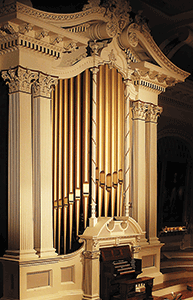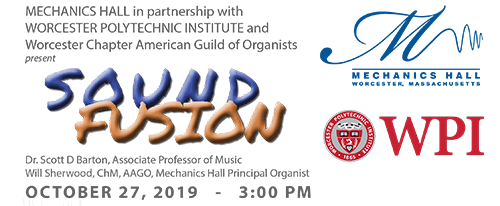
Mechanics Hall has partnered with the Worcester Polytechnic Institutes’s Music, Perception and Robotics Lab and the Worcester Chapter American Guild of Organists to explore unique technological combinations using the Hall’s 19th century Hook organ and 21st century musician robots. Live musicians add interest to the mix! The robots are created in Professor Scott Barton’s WPI laboratory. Repertoire from Bach to Rock will demonstrate how technology can serve as a catalyst for the creative arts. The robots will be interacting musically with live performers and with each other. Multi-media will allow the audience a closer look at the performance dynamics.
Biographies for Today’s Musicians
Human Musicians, in order of appearance:
- Will Sherwood, organ & synthesizer
- Gavin Klein, organ
- Anthony Topper, robot keyboard & synthesizer
- Mitzi Eppley, dance
- Patrick Chatham, cello
- Kerry Muenchow, violin
- Nate Tucker, percussion
- Cliff Goodwin, guitar
- Michael Lynch, vocal
- Scott Barton, cyther
Robotic Instruments
- Percussive Aerophone
- PAM (Poly-tangent Automatic Multi-Monochord)
- Cyther (human-playable robotic zither)
- Modular Percussion / CADI (Configurable Automatic Drumming Instrument)
Scott Barton, cyther
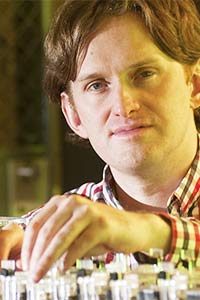 Scott Barton composes, performs, and produces (electro)(acoustic) music; conducts psychological research; and develops musical robots. His interests include rhythm, stylistic heterogeneity, perceptual organization, instrument design, machine expression, human-robot interaction, improvisation, creativity, and audio production. He founded and directs the Music, Perception and Robotics lab at WPI and co-founded Expressive Machines Musical Instruments (EMMI), a collective that designs and builds robotic musical instruments. His work in robotics explores the novel expressive capabilities of machines, and the ways in which robots can voice and inspire human creativity. As a researcher, programmer, and author, his work in rhythm perception and production has been published in journals such as Music Perception and Acta Psychologica. He fuses the worlds of psychology and robotics in software that allows robots to improvise with humans. He is active in the world of audio production as a recordist, mixer and producer. His most recent album Stylistic Alchemies (Ravello Records) features electroacoustic works that illuminate the creative potential of the studio in the synthesis and juxtaposition of musical genres. His compositions have been performed throughout the world including at SMC; ICMC; SEAMUS; CMMR and NIME. He is an Associate Professor of Music at Worcester Polytechnic Institute. scottbarton.info
Scott Barton composes, performs, and produces (electro)(acoustic) music; conducts psychological research; and develops musical robots. His interests include rhythm, stylistic heterogeneity, perceptual organization, instrument design, machine expression, human-robot interaction, improvisation, creativity, and audio production. He founded and directs the Music, Perception and Robotics lab at WPI and co-founded Expressive Machines Musical Instruments (EMMI), a collective that designs and builds robotic musical instruments. His work in robotics explores the novel expressive capabilities of machines, and the ways in which robots can voice and inspire human creativity. As a researcher, programmer, and author, his work in rhythm perception and production has been published in journals such as Music Perception and Acta Psychologica. He fuses the worlds of psychology and robotics in software that allows robots to improvise with humans. He is active in the world of audio production as a recordist, mixer and producer. His most recent album Stylistic Alchemies (Ravello Records) features electroacoustic works that illuminate the creative potential of the studio in the synthesis and juxtaposition of musical genres. His compositions have been performed throughout the world including at SMC; ICMC; SEAMUS; CMMR and NIME. He is an Associate Professor of Music at Worcester Polytechnic Institute. scottbarton.info
Will Sherwood, organ & synthesizer
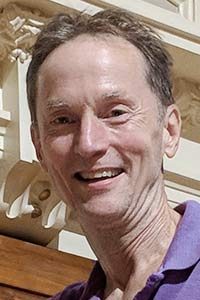 Will Sherwood (organ & piano) is Principal Organist at Mechanics Hall, and Artistic Director for the Mechanics Hall Worcester Organ Concert Series and Court Hill Music Festival. He has been Director of Music & Organist at First Unitarian for 35 years, and is past Dean of Worcester American Guild of Organists. He has appeared as guest artist with the Boston Pops, and on concert tours in Europe and the U.S. For thirty years, he was a Sr. Engineering Manager at Intel and Digital (DEC). Since corporate retirement, he is CTO & Owner of Sherwood Hosting, providing graphic & web/database design, web hosting, and commercial photography services. He is an enthusiastic runner, vegetarian, and recycler.
Will Sherwood (organ & piano) is Principal Organist at Mechanics Hall, and Artistic Director for the Mechanics Hall Worcester Organ Concert Series and Court Hill Music Festival. He has been Director of Music & Organist at First Unitarian for 35 years, and is past Dean of Worcester American Guild of Organists. He has appeared as guest artist with the Boston Pops, and on concert tours in Europe and the U.S. For thirty years, he was a Sr. Engineering Manager at Intel and Digital (DEC). Since corporate retirement, he is CTO & Owner of Sherwood Hosting, providing graphic & web/database design, web hosting, and commercial photography services. He is an enthusiastic runner, vegetarian, and recycler.
Gavin Klein, organ
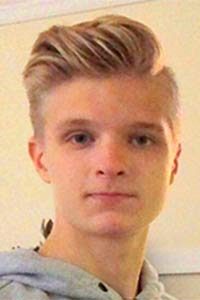 Gavin Klein remarks music to be his “life and passion.” He is a sophomore at Nashoba Regional High School in Bolton and is the current organist at the Apple Valley Catholic Collaborative Parishes of Stow and Acton (St Isidore and St Elizabeth if Hungary), Alternate Organist at the Evangelical Congregational Church of Lancaster, Permanent Substitute Organist at St Lukes Episcopal Church of Hudson, Substitute organist at St Cyprians Episcopal Church of West Roxbury, and also the substitute to many other churches in the area. Gavin first had an interest in music for “as long as he can remember,” and was inspired to play the organ after hearing some of the great organs of Europe after a European vacation with his family, most notably, the main organ of Notre Dame Cathedral in Paris. He has been studying piano since the age of four, and has studied with Judit Ernst, Amy Lee, and is currently a student of Roy Imperio. After being encouraged to start studying organ from a friend after he expressed interest in the organ, Gavin started studying the organ in 2015 with William Ness, former Minister of Music and Organist at the First Baptist Church of Worcester. Over the years, he has been the recipient of two lesson Scholarships from the Worcester Chapter of the American Guild of Organists, and another from the Boston Chapter. He is currently a member of both the Boston and Worcester Chapters of the American Guild of Organists, The Organ Historical Society, The National Pastoral Association of Musicians, and formerly, the Nashoba Symphonic Band. He is also a member of the choir at All Saints Episcopal Church of Worcester under the direction of Graeme McCullough. Gavin has played organs all over the area and even in Europe! He is an accomplished performer and has performed all over the region, and will be giving a solo recital at the Former First Baptist Church of Brattleboro, VT in January of 2020. Along with organ and piano, Gavin also plays clarinet, saxophone, flute, and guitar. Gavin is not 100% sure yet what he wants to study in college, but he firmly believes the organ will be included in that somehow. Gavin is especially grateful to all the supportive people he has met along his journey as a musician!
Gavin Klein remarks music to be his “life and passion.” He is a sophomore at Nashoba Regional High School in Bolton and is the current organist at the Apple Valley Catholic Collaborative Parishes of Stow and Acton (St Isidore and St Elizabeth if Hungary), Alternate Organist at the Evangelical Congregational Church of Lancaster, Permanent Substitute Organist at St Lukes Episcopal Church of Hudson, Substitute organist at St Cyprians Episcopal Church of West Roxbury, and also the substitute to many other churches in the area. Gavin first had an interest in music for “as long as he can remember,” and was inspired to play the organ after hearing some of the great organs of Europe after a European vacation with his family, most notably, the main organ of Notre Dame Cathedral in Paris. He has been studying piano since the age of four, and has studied with Judit Ernst, Amy Lee, and is currently a student of Roy Imperio. After being encouraged to start studying organ from a friend after he expressed interest in the organ, Gavin started studying the organ in 2015 with William Ness, former Minister of Music and Organist at the First Baptist Church of Worcester. Over the years, he has been the recipient of two lesson Scholarships from the Worcester Chapter of the American Guild of Organists, and another from the Boston Chapter. He is currently a member of both the Boston and Worcester Chapters of the American Guild of Organists, The Organ Historical Society, The National Pastoral Association of Musicians, and formerly, the Nashoba Symphonic Band. He is also a member of the choir at All Saints Episcopal Church of Worcester under the direction of Graeme McCullough. Gavin has played organs all over the area and even in Europe! He is an accomplished performer and has performed all over the region, and will be giving a solo recital at the Former First Baptist Church of Brattleboro, VT in January of 2020. Along with organ and piano, Gavin also plays clarinet, saxophone, flute, and guitar. Gavin is not 100% sure yet what he wants to study in college, but he firmly believes the organ will be included in that somehow. Gavin is especially grateful to all the supportive people he has met along his journey as a musician!
Anthony Topper, robot keyboard & synthesizer
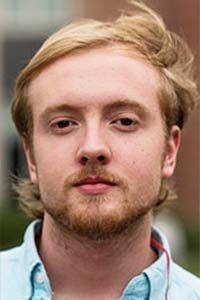 Anthony Topper is a senior at Worcester Polytechnic Institute, studying computer science. When not in his books, he devotes his time to music. He has studied piano for 15 years and began learning organ last year, and sings in the choir at WPI. You’ll find him practicing anything from Mozart to Billy Joel; it’s all a joy for him.
Anthony Topper is a senior at Worcester Polytechnic Institute, studying computer science. When not in his books, he devotes his time to music. He has studied piano for 15 years and began learning organ last year, and sings in the choir at WPI. You’ll find him practicing anything from Mozart to Billy Joel; it’s all a joy for him.
Patrick Chatham, cello
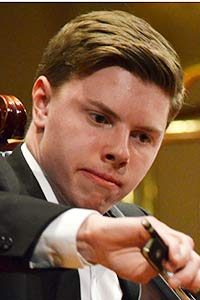 Patrick Chatham resides in Charlton Massachusetts. He has been homeschooled since the first grade. Patrick played with the Worcester Youth Symphony Orchestra from 2015-2019 and for the last 4 years in the orchestra, he was principal cellist. He has also has played with the Worcester Youth Honors String Quartet and the Worcester Youth Baroque Orchestra. He studies private lessons with Betsy Bronstein in Worcester and is a faculty member at the Worcester Music Academy where he gives private lessons. Patrick was Young Artist in Residence at the First Unitarian Church of Worcester for two years, as a soloist and with the honors string quartet. He has also attended the Global String Intensive Summer Program at Berklee College of Music twice and this year attended the New England Conservatory’s summer orchestra institute and was first chair. In his spare time Patrick performs at private functions, including weddings, parties, church services, and various school musicals.
Patrick Chatham resides in Charlton Massachusetts. He has been homeschooled since the first grade. Patrick played with the Worcester Youth Symphony Orchestra from 2015-2019 and for the last 4 years in the orchestra, he was principal cellist. He has also has played with the Worcester Youth Honors String Quartet and the Worcester Youth Baroque Orchestra. He studies private lessons with Betsy Bronstein in Worcester and is a faculty member at the Worcester Music Academy where he gives private lessons. Patrick was Young Artist in Residence at the First Unitarian Church of Worcester for two years, as a soloist and with the honors string quartet. He has also attended the Global String Intensive Summer Program at Berklee College of Music twice and this year attended the New England Conservatory’s summer orchestra institute and was first chair. In his spare time Patrick performs at private functions, including weddings, parties, church services, and various school musicals.
Kerry Muenchow, violin
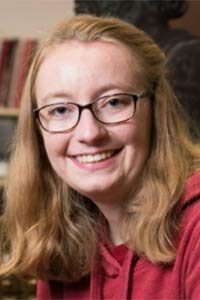 Kerry Muenchow was introduced to the Worcester music community while earning her B.S. in chemical engineering at WPI. She was the concertmaster of the WPI Symphony Orchestra, and performed with the Medwin String Quartet, Seele Musicale, and the MIT Summer Philharmonic Orchestra. Kerry began violin at age 7 and held principal positions in many ensembles in Colorado, including the Western States Honors Orchestra, Colorado All-State Honor Orchestra, Evergreen Chamber Orchestra, and Colorado Youth Symphony Orchestra. In 2011 and 2015, Kerry won the Evergreen Chamber Orchestra Concerto Competition. She previously studied with members of the Colorado Symphony Orchestra and faculty at the Luzerne Music Center in New York. Kerry currently works as a Materials and Process Engineer at Pratt &Whitney and plays with the Farmington Valley Symphony Orchestra.
Kerry Muenchow was introduced to the Worcester music community while earning her B.S. in chemical engineering at WPI. She was the concertmaster of the WPI Symphony Orchestra, and performed with the Medwin String Quartet, Seele Musicale, and the MIT Summer Philharmonic Orchestra. Kerry began violin at age 7 and held principal positions in many ensembles in Colorado, including the Western States Honors Orchestra, Colorado All-State Honor Orchestra, Evergreen Chamber Orchestra, and Colorado Youth Symphony Orchestra. In 2011 and 2015, Kerry won the Evergreen Chamber Orchestra Concerto Competition. She previously studied with members of the Colorado Symphony Orchestra and faculty at the Luzerne Music Center in New York. Kerry currently works as a Materials and Process Engineer at Pratt &Whitney and plays with the Farmington Valley Symphony Orchestra.
Nate Tucker, percussion
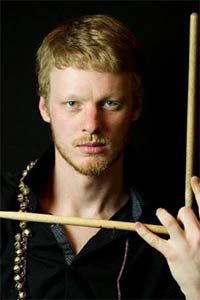 Nate Tucker, musician and composer, is based in Boston at the BCA Artist Studio Building. Tucker works regularly with some of the city\’s finest artists and arts institutions. As a performer you can catch Nate Tucker performing with collective ensemble, DanceNite, consisting of DJs, musicians, visual artists and dancers. Tucker can also be seen as a core percussionist for Juventus New Music Ensemble and DJing the Donkey Show at American Repertory Theater\’s Club Oberon from time to time.
Nate Tucker, musician and composer, is based in Boston at the BCA Artist Studio Building. Tucker works regularly with some of the city\’s finest artists and arts institutions. As a performer you can catch Nate Tucker performing with collective ensemble, DanceNite, consisting of DJs, musicians, visual artists and dancers. Tucker can also be seen as a core percussionist for Juventus New Music Ensemble and DJing the Donkey Show at American Repertory Theater\’s Club Oberon from time to time.
Cliff Goodwin, guitar
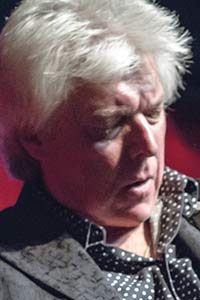 Guitarist Cliff Goodwin has amassed a four-decade legacy on the rock and roll circuit, having been launched onto the 70s rock scene in full force when his band, the Worcester-based American Standard Band, was selected by English singer Joe Cocker in 1979 as his touring and recording band. Goodwin remained with Cocker for 12 years, playing the biggest stages around the world, and performing on his biggest hits, including “Up Where We Belong.”
Guitarist Cliff Goodwin has amassed a four-decade legacy on the rock and roll circuit, having been launched onto the 70s rock scene in full force when his band, the Worcester-based American Standard Band, was selected by English singer Joe Cocker in 1979 as his touring and recording band. Goodwin remained with Cocker for 12 years, playing the biggest stages around the world, and performing on his biggest hits, including “Up Where We Belong.”
Certainly getting there took chops – and Goodwin has them, big time – but in developing his exemplary skill, Goodwin logged tens of thousands of hours performing.
This began quite early, when his first, Beatles-inspired band formed during seventh grade. In time, he elevated to local-legend status with him hometown band Albatross, and then traveled more widely as a member of the American Standard Band, which signed with Island Records in 1978.
Once in the Cocker band, however, Goodwin’s reach became international.
Around that same time, in-between tours with Cocker, Goodwin was tapped by Robert Palmer for the “Secrets” album. Goodwin’s recognizable leads can be heard on the platinum selling rocker “Bad Case of Loving You,” and other tracks.
He also managed to fit in a national tour with Jon Butcher Axis in the early 1980s, and has continued to support Butcher on recordings and contemporary performances in the last decade.
But at some point, Goodwin decided that life at home beat the grind of the road.
“I had spent so much time in Europe with Joe – three or four times a year we’d go – that I knew more about the restaurants and businesses there than I did in my home city,” Goodwin recalls. “I had a decade under my belt performing on the world’s biggest stages: Royal Albert Hall, Carnegie Hall, Sydney Opera House, you name it. But I was missing out on time with my family.”
So now for Goodwin, it has become more about loving life, having fun, playing with musician friends, and enjoying the intimacy of smaller venues and audiences.
Or is it?
While he may have sworn off touring in the 1990s, nearly two decades later, Goodwin arguably has gotten the bug, fueled by a lifetime of music, and perhaps a dose of nostalgia.
In early 2016, Goodwin and former Cocker Band battery mate Deric Dyer discussed their shared hope to do something to celebrate Joe Cocker’s legacy following the singer’s death in 2014.
Shortly thereafter, thanks to the limitless reach of the World Wide Web, the pair were introduced to another singer in the UK, Elliot Tuffin.
Tuffin, it turned out, had a lifelong devotion to the music of his fellow country man, Joe Cocker, and had spent years mastering his performance of the Cocker songbook.
After locating the singer in London, Goodwin and Dyer formed the band Mad Dogs Unchained, and took the band on a month-long tour of Europe, and released a CD and a live DVD. They are setting up an American tour for later this year, and plan on being back in Europe in 2019.
“Originally we called it Cocker Rocks, but given Joe’s biggest fan base was in Germany, we had to honor a law that prevents the use of a deceased artist’s name in promotions. Hence, we went with the name Mad Dogs Unchained,” said Goodwin. The name is a nod to the title of a Joe Cocker album, Mad Dogs and Englishmen.
So, where does recording his own album fit into the schedule for this 64-year-old rocker?
Goodwin has always been an in-demand session guy, but for other people pursuing their dreams, or hoping to cut that next huge hit.
Finally, it was his time.
In 2015, he starting talking to colleagues about a desire to make his own recording, a project that would include a number of respected musicians with whom Goodwin had worked over the years.
Working with bassist and producer David Hull, Goodwin and friends laid down the tracks for his first ever solo album, Cliff Goodwin Rhythm & Blues Union, released in the spring of 2018.
Percussive Aerophone
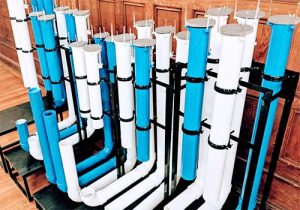
PAM (Poly-tangent Automatic Multi-Monochord)
PAM is a dulcimer-like instrument with two strings that are \”plucked\” in multiple ways, and can be dampened. Solenoid-driven fingers serve as \”fretboard stops\” to achieve the desired chromatic pitch. PAM is also played via MIDI sequencer or MIDI keyboard.
Cyther (human-playable robotic zither)
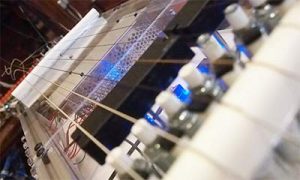
We often think of an instrument and the agent that plays it as unified. That is, we talk about a flautist or a violinist as a single thing that requires both human and instrument working symbiotically together. In other ways, performer and instrument are meaningfully distinct, and the boundary between the two is inflexible. What if this boundary is made porous, allowing the human to play the role of pseudo-static sound shaper while the instrument becomes dynamic and expressive? By integrating robotic actuation into a human-playable instrument, agency becomes amorphous and distributed as performer and machine interact through a shared medium. A human performer and the machine are able to fluidly move between the roles of impulse and filter. The robot inspires the performer with expressions made possible by mechanical actuation while the performer transforms these gestures by physically manipulating the instrument. Reciprocally, the performer can affect how the robotic system both interprets and generates ideas. The results illuminate the expressive spaces that are human, that are mechanical, that are shared between the two, and that emerge as these worlds synthesize. The actions of both become parts of a symbiotic whole, rather than self-contained instances that are co-located, thus the system exemplifies cooperative interaction. The project builds on the lineage of technology that seeks augmentation through human-machine symbiosis. The possibilities offered by such human-playable robotic musical instruments have been little explored (the vast majority of musical robots function autonomously).
Modular Percussion / CADI (Configurable Automatic Drumming Instrument)
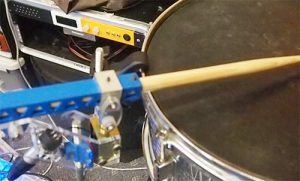
E G & G Hook Pipe Organ
American organ builders Elias and George Hook, brothers from Boston, constructed the 52-stop, 3,504-pipe instrument in 1864. It is the oldest unaltered four-keyboard pipe organ in the Western Hemisphere located at its installation site. Restored in 1982 and again in 2013, the Hook Organ is one of the most popular and respected organs in the United States. It has been featured numerous times on National Public Radio, performed in several recordings, and has been featured on television and in a major motion picture, as well as in a music video starring Michael Crawford, the original Phantom of the Opera.
More about Mechanics Hall\’s Hook Pipe Organ
Interesting Facts about the Hook Organ
SOUNDFUSION Repertoire
Toccata and Fugue in d minor, BWV 565 (ca. 1705) – J. S. Bach
Maple Leaf Rag (1899) – Scott Joplin
Tempo Mecho (2019) – Scott Barton
Prelude No. 3 in C# Major – J. S. Bach
Le cygne (The Swan) from Carnival of the Animals (1886) – Camille Saint-Saens, arr. Sherwood
Prelude No. 21 in Bb Major – J. S. Bach
Passepied (from Suite Bergamasque) (1890/1905) – Claude Debussy
Prelude No. 2 in C minor – J. S. Bach
St. Anthony Chorale – Johannes Brahms
Variations on an Armenian Tamzara
Eminence Front (1990) – The Who
Improvisation – software written by Scott Barton
arrangements/transcriptions by Scott Barton & Will Sherwood
